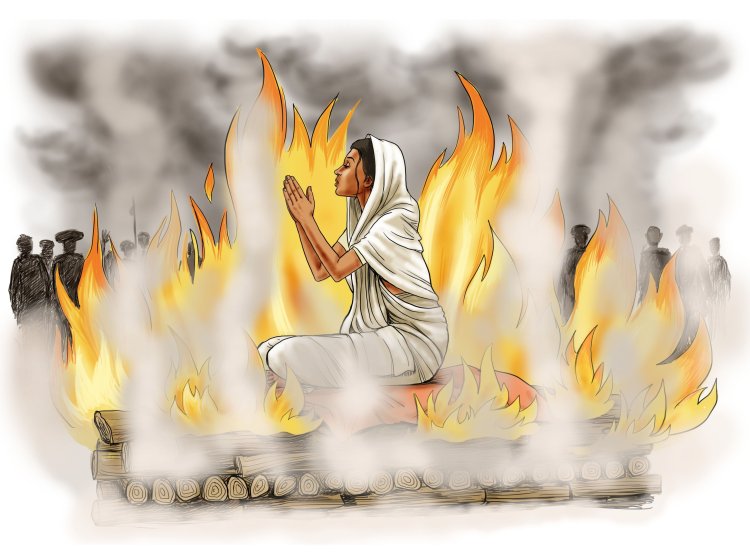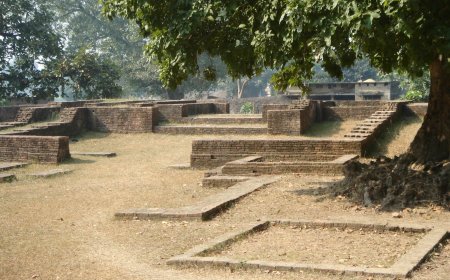Sati's Curse: Nepal's Enduring Legacy of Despair and Hope
Discover the history and significance of 'Sati le Sarape ko Desh' in Nepal, a phrase reflecting historical injustices and contemporary challenges, shaping the nation's narrative.

In the heart of the Himalayas, where majestic mountains touch the sky, and a rich cultural tapestry weaves stories of centuries gone by, there exists a phrase that echoes with despair and foreboding: "Sati le sarape ko desh." Translated, it means "The country cursed by a Sati." This somber saying encapsulates the profound sense of disillusionment and hopelessness that some Nepali elders feel about their nation's future. But where did this phrase originate, and why does it persist in the collective consciousness of Nepal?
The origins of "Sati le sarape ko desh" can be traced back to the 17th century, during the reign of King Laxmi Narsimha Malla, a time marked by relative peace and prosperity in Nepal. It was an era when iconic heritage landmarks, such as Kasthamandap, Rani Pokhari, and Hanuman Dhoka, were constructed, contributing to Nepal's rich cultural heritage. This period was also notable for Nepal's economic prosperity, largely due to the efforts of a remarkable individual - Kaji Bhim Malla.
Kaji Bhim Malla was not only a skilled commander but also a shrewd businessman. He was deeply committed to his governmental duties and was a true patriot at heart. His achievements were extraordinary - he extended Nepal's influence into Tibet, bringing several Tibetan villages under Kathmandu's rule and establishing thriving businesses in Tibet that contributed significantly to Nepal's economic well-being.However, as often happens in history, adversaries within the royal palace grew envious of Kaji Bhim's successes. They sowed deceit and false narratives in the king's ears, leading him to believe that Kaji Bhim was plotting to usurp the throne. This unfounded paranoia led to a grave injustice - Kaji Bhim's execution upon his return home.
Tragically, the injustice did not end there. Kaji Bhim was not just a devoted government official; he was also the king's brother-in-law, married to the king's sister. According to tradition, when a husband died, his wife was forced to become a sati and join him on the funeral pyre. In her agony and despair, Kaji Bhim's wife cursed the entire nation, declaring that no reasonable person would ever find happiness in this wretched country. She also directed her ire at the country's rulers, saying, "May no one who lives in this durbar ever gain wisdom."The consequences of this curse were profound. King Laxmi Narsimha Malla, burdened by guilt and madness upon realizing the truth about Kaji Bhim's innocence, was replaced by his son, Pratap Malla. Yet, the curse, born of a widow's anguish, continued to hang over Nepal like a shadow, casting doubt and despair on its future.But can a curse, uttered in a moment of anguish and despair, truly determine a nation's destiny, even in the 21st century? While "Sati le sarape ko desh" may have its origins in a historical narrative, its persistence in contemporary Nepali discourse is symbolic of deeper issues. It represents the frustration and disillusionment felt by many Nepalis in the face of ongoing challenges.
Nepal, despite its natural beauty and cultural richness, grapples with issues like corruption, political instability, and social unrest. It ranks low on international corruption perception indices, and frequent changes in government have left many Nepalis disheartened with their leaders. Law and order concerns persist, and the justice system often falls short of delivering timely and fair outcomes.However, amidst these challenges, Nepal has made significant strides in various areas. Conservation efforts have led to the tripling of the tiger population, showcasing a commitment to preserving biodiversity. Maternal and child mortality rates have been reduced, reflecting progress in healthcare and development.
The phrase "Sati le sarape ko desh" should not be seen as an insurmountable verdict on Nepal's future. Instead, it should serve as a reminder that Nepal has the potential to overcome its challenges, unlock its true potential, and chart a path toward prosperity and stability. The destiny of Nepal, like any nation, ultimately rests in the hands of its people, their leaders, and their collective will to create a brighter future.
What's Your Reaction?



































































































